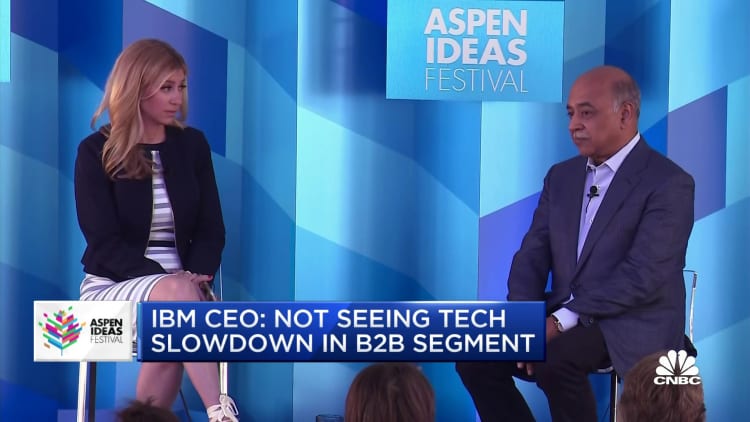Short-term market volatility can be a distraction, but it shouldn't deter companies from focusing on the long-term opportunities to invest for market share gains. The most recent quarterly CNBC CFO Council survey showed twice as many firms saying they will increase investment in the next year as those anticipating a decrease in spending. Other recent CNBC surveys of senior executives across C-suite functions show a continued focus on opportunities, too, including hiring. But there may be no aspect of budget planning where the long-term view is now more critical than in technology.
A new CNBC Technology Executive Council survey shows that more than three-quarters of senior tech leaders expect their organization to spend more on technology investments in 2022. None of the respondents said they expect to spend less on technology investments. There are particular areas of tech spending that speak to acute risk management. Nearly three-quarters of respondents said they're spending more to protect their business from cyber attacks compared to a year ago. None of the respondents said they're spending less to protect their business.
But it's about much more than just the risk of a costly hack.
A recent comment from JPMorgan CEO Jamie Dimon in defense of spending more on tech speaks to the right way to think about it. "Sometimes people refer to some of these expenses as modernizing or adopting new technologies. … the term implies that once you get to a modern platform, these expenses should dramatically decrease — which is rarely the case. … Technology always drives change, but now the waves of technological innovation come in faster and faster," he wrote in his annual letter to shareholders this year.
Reid Hoffman's warning on tech spending
This was along the lines of the outlook, and a warning, from Greylock partner Reid Hoffman to members of the CNBC Technology Executive Council in a virtual town hall last week. In areas including AI, firms that do not invest today are at an accelerating risk of being left behind.
"In this environment, we're competing for making the most and the longest-term value for our businesses. So ask yourselves: where do I have a competitive advantage and where can I play offense?" Hoffman, who is the co-author of "The Startup of You" told the group of senior tech executives.
Even if AI investments aren't to be part of today's budget, firms need to in the least stay on a learning curve with the technology and revisit it down the road. "You are sacrificing the future if you opt out of AI completely," Hoffman said.
JP Morgan's recent annual chief information officer survey, which gathered the spending plans of 142 CIOs responsible for over $100 billion in annual enterprise budgets, found that the current environment is going to have a definite impact on spending decisions, or in the least, timing of those decisions.
In recent years, CIOs set their IT budgets to grow 3-4% when US CPI ran at 1-2% (2016-2019). Currently, CIOs see 5.3% IT budget growth in calendar year 2022 and 5.7% in 2023. That's a big change from JPMorgan's pandemic period CIO survey, when IT budgets were set to contract 4.8%, but the bank's tech analysts noted that it also is not keeping pace with inflation. More CIOs do plan to delay purchases until the second half of 2022.
However these decisions are being made, there needs to be greater collaboration between the CIO and CFO teams. Recent research by technology consulting firm Gartner shows that just 30% of the CFO-CIO relationships are characterized by a level of personal and professional closeness that will lead to the best IT spending decisions. According to Gartner, that's a risk in an environment where corporate margins are under pressure from inflation and potentially stagflation and discretionary tech spending has the ability to achieve greater productivity and offset input pressures.
In some organizations, the pandemic offered another way to make tech spending more efficient throughout the organization, with the unique situation leading to delegated authority at lower levels of management across functions to approve tech budget items. Tech leaders in conversation with Reid Hoffman said this model proved to be successful in areas from sales and marketing to finance, stripping out what historically can be a protracted RFP process and negotiations between teams and the C-suite — a process which often resulted in cost-savings decisions which brought in mediocre solutions rather than the exact solutions needed by each team.
Between the C-suite collaboration on tech and the knowledge of tech needs filtering down across departments, tech leaders say the focus will be on the business value and there has been no pause in the most important initiatives aligned with winning more market share. Tech is more likely to be a method to help navigate changing market conditions than an item where cuts should be focused. And waiting too long to make tech investments can be a mistake. As the overall economy shifts from one in which goods inflation dominated CPI to the rise of services inflation, technology prices are part of that mix. The TEC survey finds more than half (57%) of senior tech leaders saying they are paying higher software prices, about twice as many as those who say hardware prices are going up.
One member of the CFO Council recently told us that when the annual renewal came in from a key service provider, the increase was over 8%, matching the most recent CPI data. This trend is not likely to change, but spending on technology is often deflationary in nature, another CFO Council member noted.
Paying up for talent in tech remains a major factor even as headlines highlight slowdowns in hiring and layoffs. IBM CEO Arvind Krishna told CNBC at the Aspen Ideas Festival on Monday that it is paying 9%-plus wage inflation to bring in talent in a difficult hiring market.

The costs of tech won't be going down, but the more spent on tech, especially tech that increases productivity, the greater the potential savings on labor cost, so the net outcome can be less overall spend. At a time when the cost of acquiring and training talent, and then retaining it is high, this adds to the deflationary case for tech investments even if a company is spending a higher proportion on tech.
Inflation isn't going to stop. IBM CEO Krishna expects elevated inflation for three to four years. Tech will not get cheaper, meaning inflation and competition are incentives to deploy tech faster. And if competitors are using technology, such as AI, firms that choose to wait may find themselves quickly behind, Hoffman said.
"We're not seeing a slowdown in the B2B space," Krishna said. He said that goes for retail automation, supply chain resiliency, cold chain distribution technology for drug companies, computational techniques for faster development of the next vaccines, and banking where more personalization built into selling financial products like loans is leading to more tech spending.
"When you get to radical changes, whether in the supply chain or a central bank, the first thing you do is think defensively," Hoffman said at the recent CNBC TEC event. "Is there some place where something could blow up, put us way over our skis? You first start with the defensive cross check, but the mistake is stopping," he said.
Business leaders need to accept the reality of "the R word" —a recession — but not without tying it to a longer-term plan "to have the strongest possible business as we get back to growth," Hoffman said.
"Don't spend across the board, but what are the expenses necessary for playing offense and not giving up key optionality? ... Not retrenching and giving up the leaning curve that could cause your business to thrive. ... You need to make sure you can continue to play, that's the defensive game, but immediately after that it's go to offense. It doesn't mean cut every last dollar," he added.






